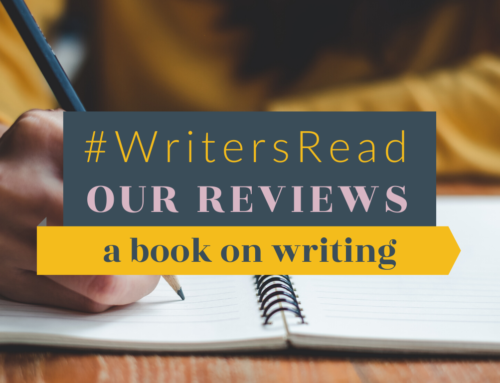For the #WritersRead book club this month, we read in the theme ‘a book set in the future.’ Through these stories, we imagine the future, armed with what we know about ourselves now (the good and the bad). As writers, we examined the ‘What If?’ questions these stories posed, what the authors had to say about the present world, and (of course!) how worldbuilding was used to enhance the story. Below you’ll find our full reviews from our picks this month. Join us later this week for book club on Twitter and Instagram!
Emily’s Review
Internment, by Samira Ahmed
Internment is marketed as set ‘a horrifying 15 minutes in the future,’ and it definitely hits home. The book follows Layla, a 17 year old Muslim American, who is sent with her parents to a Muslim internment camp. The story is painful in its realism and believability—it’s a future that feels possible, tomorrow, in a gut wrenching way.

The story’s setup eerily echoes the internment of Japanese Americans in WWII, and the rise of the Nazi regime. We’re not shown most of the build up, but it’s clear that the oppression started small—hate crimes and increased surveillance, until suddenly laws were passed that restrict the rights of a few in exchange for the protections of the majority. It’s a snowball effect, enabled by silence, and by the start of the story, there’s seemingly little reaction when Layla’s family, and so many others, disappear in the middle of the night.
As someone who reads mostly adult fiction, I hungered for more depth to the dark places in the world, and the complex psyches of those involved—but it’s a YA book, and it is YA in its execution. The story isn’t attempting to explore the intricacies of how the world got there, or how to combat it. Instead, it considers the risks and rewards of using your voice when someone is trying to silence you. We’re in Layla’s teenage mind as she learns when and how to wield her voice, and when and how to wield her silence.
To be honest, it wasn’t as much Layla’s story as it was the setting that impacted me. The believability of the world shook me to my core. It’s not a far future you can detach from, it’s a near future that feels very, very possible (and in many cases already true). Ahmed unapologetically shows how, in the face of injustice, it’s much easier to adjust to new normals, and believe ‘tomorrow will be better’, than it is to fightback—especially when you aren’t the target of the oppression. Silence is consent.
Rachel’s Review
Annihilation, by Jeff Vandermeer
Annihilation is set in a near future where Area X, a secret area near a military base, has been cut off from the rest of the world for decades. Inside Area X, nature has reclaimed all evidence of human civilizations and new ecosystems are growing but not much else is known about what goes on inside its borders. All expeditions into Area X have resulted in tragedy, whether through suicide, gunfire, cancer, or worse. This book follows the twelfth expedition into the unknown, obscure, and dangerous area.

The crowning achievement of this book is that it’s masterful in creating a constant sense of unease and confusion. Every aspect of the worldbuilding to the character development to the plot is meant to leave you struggling to grasp what’s going on in Area X and cut you off from the “known.” For instance, Vandermeer intentionally does not name the characters but instead refers to them by their positions: anthropologist, surveyor, psychologist, and (our narrator) biologist. However, this “separation from the known” feeling that is pervasive throughout the book puts you exactly in the character’s shoes and allows you to experience Area X more viscerally, as they do.
It’s one of those books where I really can’t decide if I like it or not. It doesn’t happen to me very often (usually I can instantly say whether I liked something or not and why) but this book put me so far out of my comfort zone that my brain was constantly wondering whether I was enjoying it or not. To clarify, the writingis great. VanderMeer is masterful in creating Area X and all the strange-ness that happens inside it. Everything that throws you off as a reader is meant to. Every piece of backstory illuminates the biologist’s thought processes and helps her (and us) make sense of the senseless. Not many books can pull off confusing you and leaving what happens open to interpretation, but Annihilation does it well.
However, if you asked me what the point of this book was, what “What If” question it’s asking about the world, I would struggle to answer. Yet it’s clear, with the unclear ending and explanation of what’s going on inside Area X, that the book is making some comment on how sometimes we just can’t make sense of what happens to us. And as much as we try to know or to understand, life and death are much more complicated and dangerous than we think.
Join #WritersRead!
This year we’re hosting a book club just for writers! Each month you pick a book within the month’s theme, then we’ll meet for #WritersRead book club chats on Twitter and Instagram to discuss what you read and learned. Didn’t join this month? Hop on board for next month! You’ll find the calendar of themes and details for how to join here!







I saw the movie for Annihilation and really enjoyed it. I might have to check out the book. Here’s my review! https://kmkjensen.wordpress.com/2020/02/25/what-ive-been-reading-16/